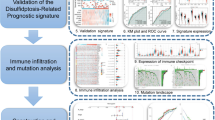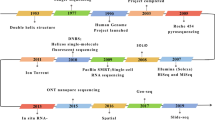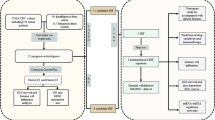Abstract
The Hedgehog signaling is a highly conserved pathway to regulate cell growth and proliferation, and plays an essential role in stomach adenocarcinoma (STAD) and other cancer types. However, previous studies were primarily conducted in terms of mRNA or vitro cell culture. It would be more convincing to integrate single-cell RNA sequencing (scRNA-seq) data because it is a more precise approach for genomic research. The expression profile, genetic alteration, and activity of the Hedgehog signaling pathway were investigated in both scRNA-seq and RNA-seq datasets of STAD. Communications between cancer cells and fibroblasts were determined by the cell-chat algorithm, and the Hedgehog-related gene signature was constructed to predict the survival of STAD. Patients were categorized into high- and low-risk groups according to the median of the signature. Further analysis explored the difference in survival outcome, tumor immune microenvironment (TIME), and drug sensitivity between the two groups, aiming to guide the use of chemotherapy and immunotherapy in STAD patients. Hedgehog signal pathway was over-activated in STAD. GAS1, GLI1, and SCEBU2 were recognized as hub genes in the prognostic signature of STAD, and served as robust risk factors to induce a poor survival outcome. Patients in the high-risk group demonstrated an exhausted TIME pattern, with rather low sensitivity toward molecular-targeted drugs. This study depicted the influence of the Hedgehog pathway on the survival outcome, TIME, and drug sensitivity of STAD, and provides novel insights for the treatment of STAD.











Similar content being viewed by others
Data Availability
The original contributions presented in the study are included in the article/supplementary material; further inquiries can be directed to the corresponding author.
References
Abdel-Rahman O (2015) Hedgehog pathway aberrations and gastric cancer; evaluation of prognostic impact and exploration of therapeutic potentials. Tumour Biol 36(3):1367–1374
Akyala AI, Peppelenbosch MP (2018) Gastric cancer and Hedgehog signaling pathway: emerging new paradigms. Genes Cancer 9(1-2):1–10
Becerril-Rico J, Alvarado-Ortiz E, Toledo-Guzmán ME, Pelayo R, Ortiz-Sánchez E (2021) The cross talk between gastric cancer stem cells and the immune microenvironment: a tumor-promoting factor. Stem Cell Res Ther 12(1):498
Chen W, Zheng R, Baade PD, Zhang S, Zeng H, Bray F et al (2016) Cancer statistics in China, 2015. CA Cancer J Clin 66(2):115–132
Cheng L, Xiong W, Li S, Wang G, Zhou J, Li H (2023) CRISPR-Cas9 screening identified lethal genes enriched in necroptosis pathway and of prognosis significance in osteosarcoma. J Gene Med e3563. https://doi.org/10.1002/jgm.3563
Cibulskis K, Lawrence MS, Carter SL, Sivachenko A, Jaffe D, Sougnez C et al (2013) Sensitive detection of somatic point mutations in impure and heterogeneous cancer samples. Nat Biotechnol 31(3):213–219
Edderkaoui M, Chheda C, Soufi B, Zayou F, Hu RW, Ramanujan VK et al (2018) An inhibitor of GSK3B and HDACs kills pancreatic cancer cells and slows pancreatic tumor growth and metastasis in mice. Gastroenterology 155(6):1985–98.e5
Furmanski AL, Saldana JI, Ono M, Sahni H, Paschalidis N, D'Acquisto F et al (2013) Tissue-derived hedgehog proteins modulate Th differentiation and disease. J Immunol 190(6):2641–2649
Geeleher P, Cox N, Huang RS (2014) pRRophetic: an R package for prediction of clinical chemotherapeutic response from tumor gene expression levels. PLoS One 9(9):e107468
Hanahan D (2022) Hallmarks of cancer: new dimensions. Cancer Discov 12(1):31–46
Hänzelmann S, Castelo R, Guinney J (2013) GSVA: gene set variation analysis for microarray and RNA-seq data. BMC Bioinform 14:7
Igney FH, Krammer PH (2002) Immune escape of tumors: apoptosis resistance and tumor counterattack. J Leukoc Biol 71(6):907–920
Jiang Y, Wang Y, Zhang J, Xie B, Liao J, Liao W (2021) Outlier detection and robust variable selection via the penalized weighted LAD-LASSO method. J Appl Stat 48(2):234–246
Jin S, Guerrero-Juarez CF, Zhang L, Chang I, Ramos R, Kuan CH et al (2021) Inference and analysis of cell-cell communication using CellChat. Nat Commun 12(1):1088
Kanehisa M, Goto S (2000) KEGG: kyoto encyclopedia of genes and genomes. Nucleic Acids Res 28(1):27–30
Karczewska-Kupczewska M, Stefanowicz M, Matulewicz N, Nikołajuk A, Strączkowski M (2016) Wnt signaling genes in adipose tissue and skeletal muscle of humans with different degrees of insulin sensitivity. J Clin Endocrinol Metab 101(8):3079–3087
Katoh M (2019) Genomic testing, tumor microenvironment and targeted therapy of Hedgehog-related human cancers. Clin Sci (Lond) 133(8):953–970
Katoh Y, Katoh M (2005) Hedgehog signaling pathway and gastric cancer. Cancer Biol Ther 4(10):1050–1054
Laner-Plamberger S, Wolff F, Kaser-Eichberger A, Swierczynski S, Hauser-Kronberger C, Frischauf AM et al (2013) Hedgehog/GLI signaling activates suppressor of cytokine signaling 1 (SOCS1) in epidermal and neural tumor cells. PLoS One 8(9):e75317
Leek JT, Johnson WE, Parker HS, Jaffe AE, Storey JD (2012) The sva package for removing batch effects and other unwanted variation in high-throughput experiments. Bioinformatics 28(6):882–883
Li H, Yu L, Zhang X, Shang J, Duan X (2022) Exploring the molecular mechanisms and shared gene signatures between rheumatoid arthritis and diffuse large B cell lymphoma. Front Immunol 13:1036239
Li H, Zhang X, Shang J, Feng X, Yu L, Fan J et al (2023a) Identification of NETs-related biomarkers and molecular clusters in systemic lupus erythematosus. Front Immunol 14:1150828
Li H, Zhou J, Zhou L, Zhang X, Shang J, Feng X, Yu L, Fan J, Ren J, Zhang R, Duan X (2023b) Identification of the shared gene signatures and molecular pathways in systemic lupus erythematosus and diffuse large B-cell lymphoma. J Gene Med e3558. https://doi.org/10.1002/jgm.3558
Liu W, Lu M, Liu B, Huang Y, Wang K (2012) Inhibition of Ca(2+)-activated Cl(-) channel ANO1/TMEM16A expression suppresses tumor growth and invasiveness in human prostate carcinoma. Cancer Lett 326(1):41–51
Martinelli DC, Fan CM (2007) Gas1 extends the range of Hedgehog action by facilitating its signaling. Genes Dev 21(10):1231–1243
Merchant JL, Ding L (2017) Hedgehog signaling links chronic inflammation to gastric cancer precursor lesions. Cell Mol Gastroenterol Hepatol 3(2):201–210
Mo H, He J, Yuan Z, Mo L, Wu Z, Lin X et al (2016) WT1 is involved in the Akt-JNK pathway dependent autophagy through directly regulating Gas1 expression in human osteosarcoma cells. Biochem Biophys Res Commun 478(1):74–80
Newman AM, Liu CL, Green MR, Gentles AJ, Feng W, Xu Y et al (2015) Robust enumeration of cell subsets from tissue expression profiles. Nat Methods 12(5):453–457
Pecoraro C, Faggion B, Balboni B, Carbone D, Peters GJ, Diana P et al (2021) GSK3β as a novel promising target to overcome chemoresistance in pancreatic cancer. Drug Resist Updat: reviews and commentaries in antimicrobial and anticancer chemo 58:100779
Ritchie ME, Phipson B, Wu D, Hu Y, Law CW, Shi W et al (2015) limma powers differential expression analyses for RNA-sequencing and microarray studies. Nucleic Acids Res 43(7):e47
Seeneevassen L, Bessède E, Mégraud F, Lehours P, Dubus P, Varon C (2021) Gastric cancer: advances in carcinogenesis research and new therapeutic strategies. Int J Mol Sci 22(7):3418
Smyth EC, Nilsson M, Grabsch HI, van Grieken NC, Lordick F (2020) Gastric cancer. Lancet 396(10251):635–648
Stuart T, Srivastava A, Madad S, Lareau CA, Satija R (2021) Single-cell chromatin state analysis with Signac. Nat Methods 18(11):1333–1341
Subramanian A, Tamayo P, Mootha VK, Mukherjee S, Ebert BL, Gillette MA et al (2005) Gene set enrichment analysis: a knowledge-based approach for interpreting genome-wide expression profiles. Proc Natl Acad Sci U S A 102(43):15545–15550
Sung H, Ferlay J, Siegel RL, Laversanne M, Soerjomataram I, Jemal A et al (2021) Global cancer statistics 2020: GLOBOCAN estimates of incidence and mortality worldwide for 36 cancers in 185 countries. CA Cancer J Clin 71(3):209–249
Tomczak K, Czerwińska P, Wiznerowicz M (2015) The Cancer Genome Atlas (TCGA): an immeasurable source of knowledge. Contemp Oncol (Poznan, Poland) 19(1a):A68–A77
Wang F, Fan M, Zhou X, Yu Y, Cai Y, Wu H et al (2021) A positive feedback loop between TAZ and miR-942-3p modulates proliferation, angiogenesis, epithelial-mesenchymal transition process, glycometabolism and ROS homeostasis in human bladder cancer. J Exp Clin Cancer Res 40(1):44
Wilkinson SE, Furic L, Buchanan G, Larsson O, Pedersen J, Frydenberg M et al (2013) Hedgehog signaling is active in human prostate cancer stroma and regulates proliferation and differentiation of adjacent epithelium. Prostate 73(16):1810–1823
Xu Y, Song S, Wang Z, Ajani JA (2019) The role of hedgehog signaling in gastric cancer: molecular mechanisms, clinical potential, and perspective. Cell com and signal: CCS 17(1):157
Zhang P, Yang M, Zhang Y, Xiao S, Lai X, Tan A et al (2019) Dissecting the single-cell transcriptome network underlying gastric premalignant lesions and early gastric cancer. Cell Rep 27(6):1934–47.e5
Author information
Authors and Affiliations
Contributions
KL designed the study. JZ, YS, SW, TZ, JY, and YH performed data analysis. JZ drafted the manuscript. KL revised the manuscript. All authors read and approved the final manuscript.
Corresponding author
Ethics declarations
Ethics approval and consent to participate
Not applicable.
Consent for publication
Not applicable.
Competing interests
The authors declare no competing interests.
Additional information
Publisher’s note
Springer Nature remains neutral with regard to jurisdictional claims in published maps and institutional affiliations.
Rights and permissions
Springer Nature or its licensor (e.g. a society or other partner) holds exclusive rights to this article under a publishing agreement with the author(s) or other rightsholder(s); author self-archiving of the accepted manuscript version of this article is solely governed by the terms of such publishing agreement and applicable law.
About this article
Cite this article
Zhong, J., Sun, Y., Wu, S. et al. The impact of the Hedgehog signal pathway on the tumor immune microenvironment of gastric adenocarcinoma by integrated analysis of scRNA-seq and RNA-seq datasets. Funct Integr Genomics 23, 258 (2023). https://doi.org/10.1007/s10142-023-01187-w
Received:
Revised:
Accepted:
Published:
DOI: https://doi.org/10.1007/s10142-023-01187-w




